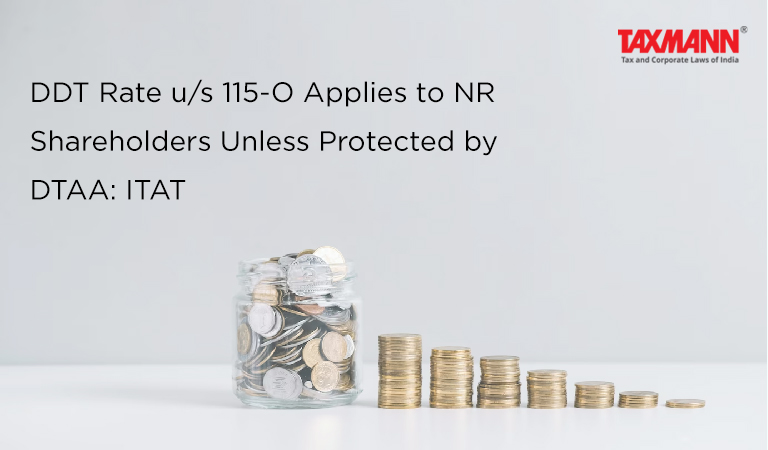DDT Rate u/s 115-O Applies to NR Shareholders Unless Protected by DTAA: ITAT
- Blog|News|Income Tax|
- 2 Min Read
- By Taxmann
- |
- Last Updated on 22 April, 2023

Case Details: DCIT v. Total Oil India (P.) Ltd. - [2023] 149 taxmann.com 332 (Mumbai-Trib.) (SB)
Judiciary and Counsel Details
-
- G. S. Pannu, President, N.V. Vasudevan, Vice-president & Vikas Awasthy, Judicial Member
- V. Sridharan, Ajay Vohra, Sr. Advs. Niraj Sheth, Neeraj Jain, Adv. Anshul Sachar, Alok Vasant, Ravi Sawana & Dinesh Kukreja for the Appellant.
- Vinod Tanwani for the Respondent.
Facts of the Case
The question for consideration before the Special Bench of the Mumbai Tribunal was:
“If a domestic company pays dividends to non-resident shareholders, whether the dividend distribution tax (DDT) shall be payable at the rate mentioned in Section 115-O or the tax rate applicable to non-resident shareholder(s) with reference to such dividend income?”
ITAT Held
The Mumbai Tribunal held that the first aspect that needs to be decided is whether DDT is a tax on the company or the shareholder. Can one say it is a tax payable by the shareholder, whose liability is discharged by the domestic company in the form of payment of DDT?
The Bombay High Court in the case of Godrej & Boyce Mfg. Co. Ltd. [2010] 194 Taxman 203 (Bombay) held that legal characteristics of DDT are a tax on a company paying the dividend and “is chargeable to tax on its profits as a distinct taxable entity. The domestic company paying DDT does not do so on behalf of the shareholder, and the company does not act as an agent of the shareholder in paying the tax under Section 115-O.
Although the Hon’ble Supreme Court reversed the Bombay High Court ruling, the observations of the Bombay High Court regarding the legal characteristics of DDT that it is a tax on a company paying the dividend cannot be said to have been diluted or overruled.
Thus, it can be concluded that the charge under section 115-O is on the company’s profits and not income in the hands of the shareholder.
Regarding the applicability of DTAA, the bench held that the domestic company resident in India pays DDT. It is a tax on its income and not tax paid on behalf of the shareholder. In such circumstances, the domestic company under section 115-O does not enter the domain of DTAA at all. If the domestic company has to enter the domain of DTAA, the partner countries should have agreed specifically in the DTAA to that effect.
For instance, in the Treaty between India and Hungary, the Contracting States extended the Treaty protection to the DDT. It has been specifically provided in the protocol to the Indo-Hungarian Tax Treaty that when the company paying the dividends is a resident of India, the tax on distributed profits shall be deemed to be taxed in the hands of the shareholders, and it shall not exceed 10 per cent of the gross amount of dividend.
Therefore, the DTAA is not triggered when a domestic company pays DDT under section 115-O.
Accordingly, the bench held that where the dividend is declared, distributed or paid by a domestic company to a non-resident shareholder(s), DDT shall be payable by the domestic company at the rate mentioned in Section 115-O.
However, the domestic company can claim the benefit of DTAA if the Contracting States extend the treaty protection to the domestic company paying dividend distribution tax.
Disclaimer: The content/information published on the website is only for general information of the user and shall not be construed as legal advice. While the Taxmann has exercised reasonable efforts to ensure the veracity of information/content published, Taxmann shall be under no liability in any manner whatsoever for incorrect information, if any.

Taxmann Publications has a dedicated in-house Research & Editorial Team. This team consists of a team of Chartered Accountants, Company Secretaries, and Lawyers. This team works under the guidance and supervision of editor-in-chief Mr Rakesh Bhargava.
The Research and Editorial Team is responsible for developing reliable and accurate content for the readers. The team follows the six-sigma approach to achieve the benchmark of zero error in its publications and research platforms. The team ensures that the following publication guidelines are thoroughly followed while developing the content:
- The statutory material is obtained only from the authorized and reliable sources
- All the latest developments in the judicial and legislative fields are covered
- Prepare the analytical write-ups on current, controversial, and important issues to help the readers to understand the concept and its implications
- Every content published by Taxmann is complete, accurate and lucid
- All evidence-based statements are supported with proper reference to Section, Circular No., Notification No. or citations
- The golden rules of grammar, style and consistency are thoroughly followed
- Font and size that’s easy to read and remain consistent across all imprint and digital publications are applied



 CA | CS | CMA
CA | CS | CMA
